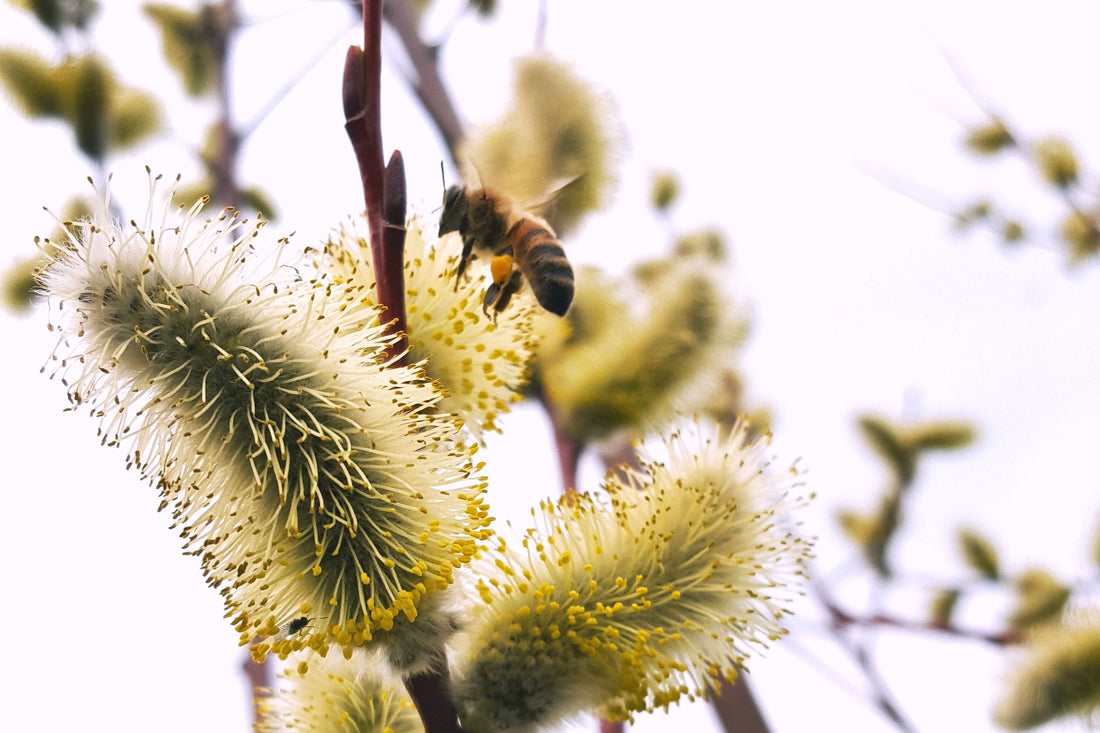
Bee Pollen: A Beehive Superfood
What is Bee Pollen?
Honey bee workers visit a wide variety of floral sources. During these visits the workers get covered in tiny grains of pollen, which stick to their legs and body hairs. The bees spread the pollen from plant to plant, pollinating them and making our food grow. Every so often, the worker bees use their legs to scrape the pollen from their hairs into special “baskets” on their back legs so that they can carry it back to the hive, where it is used as a protein source to feed young developing bee larvae.
A hive of bees can gather over 60 pounds of pollen in the spring! It is an essential component in the beehive - a lack of pollen causes the queen to stop laying eggs and a severe lack would cause colony death.
Check out these photos of pollen on bees' body hair and legs.


Health Benefits of Pollen
Historically, pollen is known to have been used by ancient Greek’s athletes and Norse gods, among many others.
Pollen analysis has shown that pollen is a storehouse of proteins, essential fatty acids, vitamins, minerals, lipids, sugars, enzymes, carotenoids and bioflavonoids. No other food contains as many elements necessary for life as pollen does:
- Pollen contains all 28 minerals that the human body requires for healthy function.
- Pollen has high levels of vitamins A, B, C, D and E.
- It is about 35% protein, with half of these in the form of essential amino acids that our bodies easily digest.
- 40% of pollen is various types of natural sugars, 5% is fats, and 3% is minerals and oligo-elements (which carry minerals).
- 3% is moisture, and the remaining materials are trace elements such as folic acid and biotin.
Regular consumption of pollen can contribute to health in many ways, reducing inflammation and stimulating the immune & metabolic systems. The nutrients in pollen can help correct metabolic dysfunction and regulate appetite. In addition, pollen’s antioxidants help neutralize free radicals and slow down the aging process. Pollen also helps strengthen capillaries, lower cholesterol levels and boosts liver function. Finally, the well rounded nutrients in pollen help promote mental wellness! You may find that after consuming pollen regularly for two weeks, you notice less “brain fog”.
I collect my pollen carefully to ensure that I'm not taking too much from any single beehive. This involves careful and regular monitoring of special pollen traps as well as my hives. Once the pollen has been collected I store it in the freezer so that it can be used as fresh frozen pollen grains. I believe this is preferable to drying pollen because dried pollen has reduced levels of enzymes and vitamins, whereas fresh frozen pollen is considered “raw” with all nutrients intact.
How to Eat Pollen
If you have never consumed pollen before, it is recommended that you begin small. Take several grains each morning and work your way up to a teaspoonful per day.
Some people are allergic to pollen or pollen from specific plants, and react badly to consuming even small amounts. However, taken in moderation, pollen can also help you build an immunity which can ease allergy symptoms to pollens floating on the air in spring and summer.
Fresh frozen pollen can be taken under the tongue (let rest for as long as possible before swallowing), or stirred into water or juice, or mixed with a teaspoon of honey. Alternatively, you can get bee pollen creamed honey, which is a special product I carry from my brother's business, Nith Valley Apiaries, made with pollen carefully collected from their hives in the Ellice Swamp area.
Once you are accustomed to pollen you can add it into your diet in various ways. Try these:
- sprinkle it on salads
- over a little dish of vanilla ice cream
- as a topping on crackers with soft cheese
- add to smoothies
- sprinkle onto honey toast
- add to a homemade sourdough bread loaf (or any kind of homemade baking)
Making pollen a regular part of your diet will have great benefits for your mind and body!
For more information about pollen and it’s uses, visit:
www.apitherapy.com
www.apitherapy.org
www.apitherapynews.com
www.honeybeecentre.com/apitherapy
www.healthline.com/health/bee-pollen-benefits
www.albeena.co.uk/blog/fresh-frozen-bee-pollen-helps-you-lose-weight-in-a-healthy-way/
www.mainstreethoney.com/products/store/health-and-nutrition/bee-pollen/
